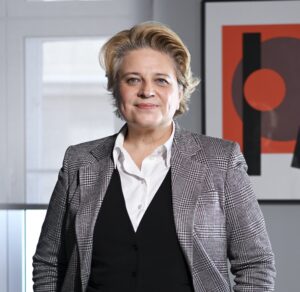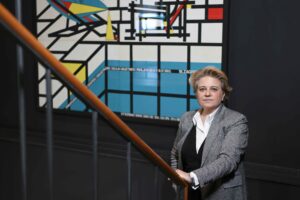Aleksandra Cvetković is a Member of the Management Board of Kent Bank. She started her business journey at one of the largest universities in the UK, and through Croatia, Hungary and Croatia again, today she is a decision maker in the banking sector, where she has proven herself to be an excellent manager with passion for transformations, change of status quo and business growth. She believes that it is necessary to continuously work on yourself, seek inspiration and ideas from various fields and walks of life and always expose yourself to new experiences, particularly in culture, art, music, theater, technology. For Diplomacy&Commerce, she explains what it’s like to be a successful woman in business and is there a shortcut to success.

1. According to official data, about 16% of women are in management positions at large or medium companies in Croatia. You are one of them, as a member of the board of Kent Bank. How difficult is it to be where you are today? How was your business journey?
At the time when I started my professional career, the journey was somewhat atypical. It was in 1997 when I graduated Economics and Management from University of Leeds and I remember I was the only student not only from Croatia but from this region. I was lucky to start my first job in London in Arthur Andersen. That company ensured I get my work permit, which was really hard to get and I remember first training we got was on business ethics and this sticks with me to this day. But I never really wanted to be an auditor, so after a few years when I felt I learnt enough about financial analysis I moved back to Zagreb and got a job at Zagrebačka banka. At that time for more than a decade of years 2000 Zaba was the most progressive company, invested a lot into development of young talents, we were setting the standards in banking, corporate governance, innovation. It really was a thriving organisation that truly lived values of diversity, respect and meritocracy. I really always had a feeling that all my progress was based on merit and this is so important for young people. Then in 2014 I was promoted to a Management Board level in UniCredit Hungary. And that was totally another level in my professional career, it was from governance point of view big game horizontally, vertically, however you want it. So I had experience of managing big divisions over 1.500 employees, managing balance sheet in excess of 1 bln euro. It was great and it was successful because I managed to set up a great team which is still there in place. But then after four years I decided to try something new, moved back to Zagreb and joined KentBank, which at that time I saw as a great platform where I could contribute to its total repositioning in a Croatian market. And we managed in three years to create best, now medium size bank in Croatia which is fully focused on small, mid and family business and free professions. We are a traditional bank with personal approach enhanced with sound, and soon, I dare say, some of the best digital solutions in the country.
2. What should be done to make women more visible in business and to improve statistics in favour of women? Things seem to be changing but slowly. How relevant is the general division of business into men and women in 2024 (considering that practice shows something different compared to theory)?
Statistics is a result of actions. And actions need to be consistent, transparent and relevant. From my experience key to improving this situation is in following meritocracy and abandoning bias. Every organisation that manages to do that, and that change comes always from the top, will be successful in the long run. If you look at the topic from the point of view of statistics, it is simply not natural to have the distribution skewed in the direction of men. Because gender wise in numbers there are slightly more women in general population, women are more educated in terms of higher education, so how come at some point this distribution is skewed in favour of men. Because of biases. And this is tough, as a lot of the time these biases are unconscious, hidden in cultural norms and equally exist in both women and men decision making. Removing them from our decision making process needs conscious effort. Changing this requires not only time but also cultural changes that are deeply rooted into a society. Until this changes, even solutions like quotas, when done properly, I see as a viable shortcut. And we need to talk a lot about the topic, especially when it is uncomfortable.

3. What would be your advice to all women in business? Is there a secret to success?
There is no secret really. You simply need to love what you do, it needs to excite you. Not all the time of course as that is not possible. But special achievements, they need to make you do a happy dance with your team. And hard and consistent dedication and work is extremely important because that gives you credibility to ask if not given. And continuously work on yourself, seek inspiration and ideas from various fields and walks of life, aim to be excellent at what you do, but also always expose yourself to new experiences, particularly in my opinion culture, art, music, theatre, technology, because these things move boundaries remove status quo and they have potential to give perspectives for your business that you never dreamt of. It is not easy, but make an effort and give time and consideration to people who do not think like you, who challenge your thought as that will ensure personal growth and with that comes professional growth and fulfilment of your purpose in any organisation regardless of the industry in which you operate.
4. How much Kent bank pays attention to the position of women and in general that all employees feel good working for you?
Employees feeling good and safe is of utmost importance for us as management. Not everyone is happy all that time of course, that would be impossible and not really natural. But if you as management seek to create an environment in which people feel respected, wanted, listened to, then this is the foundation for having happy and productive workplace. This approach is totally gender neutral and it gives good results also in terms of gender balance. Which in our bank resulted with 50:50 share on the Board level and 60:40 in favour of men on the Board minus one level.

5. Kent Bank is part of the Süzer Group from Turkey. What makes you different from others on the market for potential clients, investors…?
Suzer Group was established in 1952 by Mr Suzer, then a young entrepreneur who in his lifetime grew one of the top Groups in that country and became one of the first few Turkish companies whose foreign trade volume exceeded 1 billion dollars. The Group operates in international markets including EU and USA. Financial industry and KentBank is a crown jewel in the portfolio in Suzer Group. And the Group has some other very valuable jewels, such as for example Ritz Carlton hotel in Istanbul. So we are part of a very distinguished group which gives us strong back up, understanding of entrepreneurial mindset and banking competencies reenforced with experience and knowledge of various industries such as energy, real estate development, energy, tourism.
6. Kent bank drew attention with “Festival of Ideas” event. Will you continue with the festival and what messages do you want to send from such a beautiful event?
Thank you for such nice words. Festival of Ideas is something we are actually very proud of. It is an event that we always do in the spring season in our KentClub. The Festival itself was born from our great desire to start a different story and to give something meaningful back to the society in which we as KentBank live and operate. Our role is manifested in the fact that we have the opportunity to offer the bank, our space and resources, as a platform for something that truly, independently and bias-free encourages excellence, opens minds and in the end creates new opportunities and perspectives for all participants. The concept is very simple: gather prominent people from different industries, provide them with a pleasant and relaxed atmosphere, add to that an open-minded audience and let things unfold themselves. In addition to these important topics that both panellists and participants discuss, there is always a lot of laughter, exchange of success and failure stories, how ideas are born, what is inspiration, and also why is inclusion, tolerance and open mindedness so important for individual and society progres.